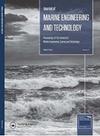船用高精度压阻式压力传感器的温度特性及补偿算法
IF 4.4
4区 工程技术
Q1 Engineering
Journal of Marine Engineering and Technology
Pub Date : 2020-11-18
DOI:10.1080/20464177.2019.1633881
引用次数: 7
摘要
压力传感器用于海洋水文测量,是深海探测、海啸预报和海洋工程的重要设备。硅压阻传感器由于其工艺成熟、生产成本低,在工业压力测量领域得到了广泛的应用。然而,其温度效应会导致不可忽略的动态误差,不能满足深海环境的要求。介绍了一种基于应力杯结构的蓝宝石上硅压力传感器。由于温度漂移,输出电压值在−6~50°C的范围内出现高偏差。为了最大限度地减少这种温度影响,提出了一种温度补偿算法,以在满刻度60中实现0.03%的精度 MPa范围。与深海实验中的参考商业传感器相比,测试压力传感器具有较小的误差、良好的相似性和相干性。该数值方法为环境自适应传感器提供了一个新的研究方向。可以强调的是,该传感器在无人值守的长期海洋观测系统中具有良好的应用前景。本文章由计算机程序翻译,如有差异,请以英文原文为准。
Temperature characteristic and compensation algorithm for a marine high accuracy piezoresistive pressure sensor
Pressure sensor used in marine hydrographic survey is an important device for the deep sea detection, the tsunami forecast and the marine engineering. Owing to its mature technology process and low production cost, silicon piezoresistive sensor is widely applied in the field of industrial pressure measurement. However, its temperature effect can result in non-negligible dynamic error, which cannot meet requirement of deep sea environment. The silicon-on-sapphire pressure sensor based on stress cup structure is presented. The output voltage values show a high deviation in the range of −6∼50°C due to temperature drift. In order to minimise this temperature effect, a temperature compensation algorithm is proposed to realise 0.03% accuracy in the full scale 60 MPa range. Compared with a reference commercial sensor in deep sea experiment, the test pressure sensors exhibit minor error, excellent similarity and coherence. This numerical method provides a new research direction for environmental self-adaptive sensor. It can be emphasised that this sensor will have a good application prospect in unattended long-term ocean observation system.
求助全文
通过发布文献求助,成功后即可免费获取论文全文。
去求助
来源期刊

Journal of Marine Engineering and Technology
工程技术-工程:海洋
CiteScore
5.20
自引率
0.00%
发文量
0
审稿时长
>12 weeks
期刊介绍:
The Journal of Marine Engineering and Technology will publish papers concerned with scientific and theoretical research applied to all aspects of marine engineering and technology in addition to issues associated with the application of technology in the marine environment. The areas of interest will include:
• Fuel technology and Combustion
• Power and Propulsion Systems
• Noise and vibration
• Offshore and Underwater Technology
• Computing, IT and communication
• Pumping and Pipeline Engineering
• Safety and Environmental Assessment
• Electrical and Electronic Systems and Machines
• Vessel Manoeuvring and Stabilisation
• Tribology and Power Transmission
• Dynamic modelling, System Simulation and Control
• Heat Transfer, Energy Conversion and Use
• Renewable Energy and Sustainability
• Materials and Corrosion
• Heat Engine Development
• Green Shipping
• Hydrography
• Subsea Operations
• Cargo Handling and Containment
• Pollution Reduction
• Navigation
• Vessel Management
• Decommissioning
• Salvage Procedures
• Legislation
• Ship and floating structure design
• Robotics Salvage Procedures
• Structural Integrity Cargo Handling and Containment
• Marine resource and acquisition
• Risk Analysis Robotics
• Maintenance and Inspection Planning Vessel Management
• Marine security
• Risk Analysis
• Legislation
• Underwater Vehicles
• Plant and Equipment
• Structural Integrity
• Installation and Repair
• Plant and Equipment
• Maintenance and Inspection Planning.
 求助内容:
求助内容: 应助结果提醒方式:
应助结果提醒方式:


